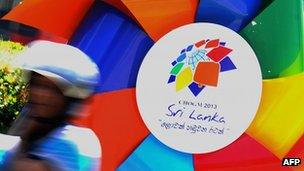MPs criticise UK 'timidity' over Sri Lanka summit venue choice
- Published

Canada has said it will not participate in the summit and is reconsidering financial aid to the Commonwealth
The UK failed to take a "principled stand" when it agreed to allow Sri Lanka to host the forthcoming summit of Commonwealth leaders, MPs say.
The Commons Foreign Affairs Committee said, external the UK should have made its approval conditional on progress on Sri Lanka's human rights record.
Canada says it will not attend next month's summit over alleged abuses by the Sri Lankan authorities.
UK PM David Cameron says he cannot raise concerns unless he is present.
Campaigners want the Sri Lankan authorities to allow an independent investigation into allegations that government forces committed war crimes towards the end of a decades-long civil war that ended in 2009.
The UN estimates that 40,000 civilians were killed in the last five months of the conflict but the Sri Lankan authorities insist that a rehabilitation process is under way after years of fighting.
The cross-party committee of MPs makes its reservations about the UK's handling of its relations with Sri Lanka clear in an audit of the Foreign Office's human rights work in 2012.
The Commonwealth Secretariat, the organisation's ruling body, decided to award the right to host the 2013 Commonwealth Heads of Government Meeting (CHOGM), which takes place every two years, to Sri Lanka in 2009.
The decision must be approved by the heads of government of each of the body's 52 members.
But the MPs say that although the UK objected in 2009 to the event being held in Sri Lanka in 2011, it made no such intervention regarding the 2013 venue - a stance the committee said was "inconsistent".
'More robust'
The committee said there had been "scant evidence" of any improvement in the Sri Lankan government's treatment of political opponents, with evidence of continuing attacks on the judiciary and civil society groups.
After a visit to the country in August, the UN's High Commissioner for Human Rights warned that the country was heading in an "increasingly authoritarian direction".
Although it was not practical to re-open the question about the summit's location at this late stage, the MPs said it was right to question whether the UK had "played its hand" properly.
"The UK could and should have taken a more principled stand in 2009, and should have taken a more robust stand after the 2011 Chogm in the light of the continuing serious human rights abuses in Sri Lanka," the report said.
"The Foreign Office objected to a proposal that Sri Lanka might host the 2011 Chogm on human rights grounds but did not obstruct a proposal that it might do so in 2013.
"Nor did it insist that Sri Lanka's right to host in 2013 should be conditional on improvements in human rights. That approach now appears timid."
'Big believers'
The report notes human rights groups, such as Amnesty International, do not support Canada's boycott of the event, urging Mr Cameron instead to travel to the north of the country and to seek guarantees that those members of NGOs he speaks to do not face reprisals afterwards.
Speaking last week, Mr Cameron said it was right for him to attend the summit since the UK were "big believers" in the Commonwealth and its values.
But he added: "I think it is right in going to the Commonwealth conference we should not hold back in being very clear about those aspects of the human rights record in Sri Lanka that we are not happy with."
Labour MP Simon Danczuk is also pressing the PM to highlight the case of British man Khuram Shaikh, who was killed in Sri Lanka in 2011. Eight people, including a Sri Lankan politician, were arrested and bailed in November.
Russian Olympics
On other matters, the committee backs the UK's decision to lift economic sanctions against Burma in April but says it should be prepared to reconsider if undertakings by the Burmese government on human rights are not met.
It also rejects suggestions that the 2014 Winter Olympic and Paralympic Games should be boycotted in protest at human rights abuses in Russia.
Gay rights campaigners have called for action after laws were passed banning the dissemination of "homosexual propaganda" to minors - a move they claim will effectively prevent any public gay rights event.
But the committee said the Games provided a platform for wider social and cultural concerns to be voiced in a way which would be difficult for the host country to brush aside.
- Published7 October 2013
- Published27 July 2013
- Published30 April 2013
- Published26 September 2013
- Published12 August 2013